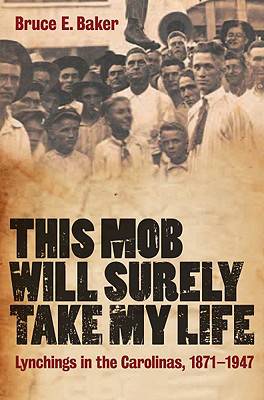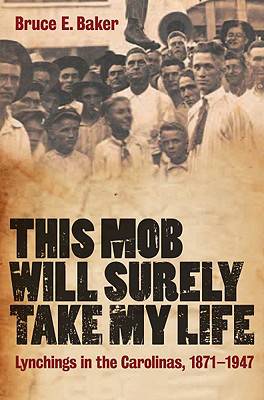
- Retrait gratuit dans votre magasin Club
- 7.000.000 titres dans notre catalogue
- Payer en toute sécurité
- Toujours un magasin près de chez vous
- Retrait gratuit dans votre magasin Club
- 7.000.0000 titres dans notre catalogue
- Payer en toute sécurité
- Toujours un magasin près de chez vous
This Mob Will Surely Take My Life
Lynchings in the Carolinas, 1871-1947
Bruce E Baker
Livre relié | Anglais
152,95 €
+ 305 points
Description
This book traces the history of mob violence in North and South Carolina, probing the origins of a phenomenon that has left an open wound in the American psyche.
Lynching marked the violent outer boundaries of race and class relations in the American South between Reconstruction and the civil rights era. Everyday interactions could easily escalate into mob violence and did so thousands of times. Bruce E. Baker examines this important aspect of American history by studying seven lynchings in North and South Carolina and looking behind the superficial accounts and explanations provided at the time to explain the deeper causes and wider contexts of these events.
Many studies of lynching begin only after Reconstruction had ended and African- Americans found themselves with little political power. This Mob Will Surely Take My Life, however, provides the most thorough study yet written of the Ku Klux Klan's most violent episode - the killing of thirteen black militia members in Union, South Carolina, in 1871- to argue that this act of mob violence set the stage in important ways for the entire lynching era. Enmities born in Reconstruction lingered afterwards and lay behind an 1887 lynching in York County, South Carolina. As lynching became an unsurprising part of life in the South, African-Americans even found that they could use it themselves, in one case to punish a child's killer and in another to settle a church's factional squabbles. The book ends with a discussion of the varied forces that opposed lynching and how, by the 1930s, they had begun to be effective.
Lynching marked the violent outer boundaries of race and class relations in the American South between Reconstruction and the civil rights era. Everyday interactions could easily escalate into mob violence and did so thousands of times. Bruce E. Baker examines this important aspect of American history by studying seven lynchings in North and South Carolina and looking behind the superficial accounts and explanations provided at the time to explain the deeper causes and wider contexts of these events.
Many studies of lynching begin only after Reconstruction had ended and African- Americans found themselves with little political power. This Mob Will Surely Take My Life, however, provides the most thorough study yet written of the Ku Klux Klan's most violent episode - the killing of thirteen black militia members in Union, South Carolina, in 1871- to argue that this act of mob violence set the stage in important ways for the entire lynching era. Enmities born in Reconstruction lingered afterwards and lay behind an 1887 lynching in York County, South Carolina. As lynching became an unsurprising part of life in the South, African-Americans even found that they could use it themselves, in one case to punish a child's killer and in another to settle a church's factional squabbles. The book ends with a discussion of the varied forces that opposed lynching and how, by the 1930s, they had begun to be effective.
Spécifications
Parties prenantes
- Auteur(s) :
- Editeur:
Contenu
- Nombre de pages :
- 256
- Langue:
- Anglais
Caractéristiques
- EAN:
- 9781847252388
- Date de parution :
- 15-11-08
- Format:
- Livre relié
- Format numérique:
- Genaaid
- Dimensions :
- 166 mm x 240 mm
- Poids :
- 535 g

Les avis
Nous publions uniquement les avis qui respectent les conditions requises. Consultez nos conditions pour les avis.






